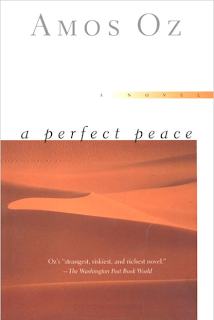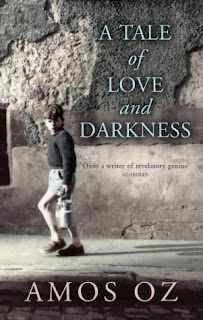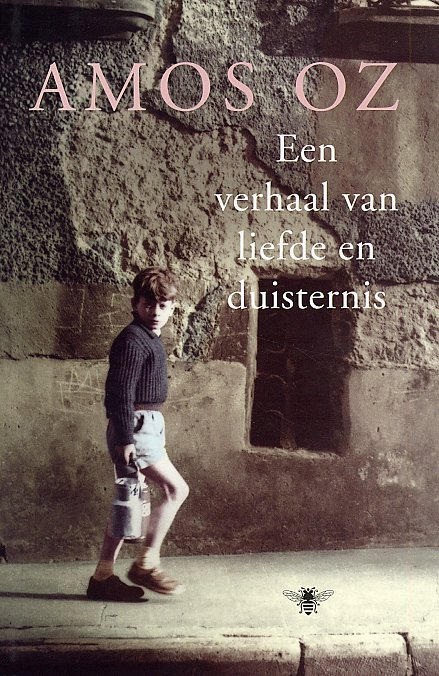Uiteraard komt Spinoza weer voor in de nieuwste van Amos Oz
 Wie weet hoeveel Spinoza voorkomt in Amos Oz’s A Perfect Peace [Mariner Books; Reissue edition, 1993] en hoe hij in zijn memoires, A Tale of Love and Darkness (2004), schrijft over de discussies die hij als kind in een joodse arbeiderswijk in Jeruzalem in de 40-iger jaren hoorde o.a. iemand “who called for the Orthodox Jewish ban on Spinoza to be lifted,” zoals Joseph Klausner, Oz’s grootoom, in 1927 bij gelegenheid van de 250e verjaardag van de dood van Spinoza in 1677, de herem had trachten teniet te doen,
Wie weet hoeveel Spinoza voorkomt in Amos Oz’s A Perfect Peace [Mariner Books; Reissue edition, 1993] en hoe hij in zijn memoires, A Tale of Love and Darkness (2004), schrijft over de discussies die hij als kind in een joodse arbeiderswijk in Jeruzalem in de 40-iger jaren hoorde o.a. iemand “who called for the Orthodox Jewish ban on Spinoza to be lifted,” zoals Joseph Klausner, Oz’s grootoom, in 1927 bij gelegenheid van de 250e verjaardag van de dood van Spinoza in 1677, de herem had trachten teniet te doen,

en hoe hij in die jeugdherinneringen een schitterende scène met Ben Goerion over Spinoza beschrijft (zie dit blog), die zal niet verbaasd zijn te vernemen dat in zijn nieuwste boek dat hij samen schreef met zijn dochter die historica is, ook Spinoza weer voorkomt.

Amos Oz and Fania Oz-Salzberger, Jews and Words. Yale University Press, nov. 2012, ISBN 9780300156478
Zij vinden dat in Israel te weinig met de Bijbel als belangrijke joodse literatuur wordt gedaan.
Natasha Lehrer in een recensie in The Jewish Chronicle online vandaag: »As they point out, Jewish texts “are our cultural and intellectual gateways to the world”, yet the secular Israeli society in which they live has long distrusted interest in the culture of the Bible as “at best atavistic… at worst triumphalist or nationalist.”For the authors, this is, at the very least, misguided. Citing Spinoza’s “brave denial of biblical authority over metaphysical truth and historical narrative,” they propose a defence of secularism as a form of “intellectual restlessness” and insist that the Hebrew Bible is a work of human creativity that demands critical scholarship.«
De uitgever over het boek:
» Why are words so important to Jews? Novelist Amos Oz and historian Fania Oz-Salzberger roam the gamut of Jewish history to explain the integral relationship of Jews and words. Through a blend of storytelling and scholarship, conversation and argument, father and daughter tell the tales behind Judaism's most enduring names, adages, disputes, texts, and quips. These words, they argue, comprise the chain connecting Abraham with the Jews of every subsequent generation. Framing the discussion within such topics as continuity, women, timelessness, and individualism, Oz and Oz-Salzberger deftly engage Jewish personalities across the ages, from the unnamed, possibly-female author of the "Song of Songs" through obscure Talmudists to contemporary writers. They suggest that Jewish continuity, even Jewish uniqueness, depends not on central places, monuments, heroic personalities, or rituals, but rather on written words and an ongoing conversation between the generations. Full of learning, lyricism, and humour, "Jews and Words" offers an extraordinary tour of the words at the heart of Jewish culture and extends a hand to the reader, any reader, to join the dialogue.
Amos Oz is an internationally acclaimed author of more than fifteen works of fiction and numerous essays on politics, literature and peace. He is also professor of literature at Ben-Gurion University in Be’er Sheva. Fania Oz-Salzberger is a writer, historian and professor at the University of Haifa. She also holds the Leon Liberman Chair in Modern Israel Studies, Monash University, Australia. «
Als tegenhanger de omgekeerde cover van de Nederlandse vertaling.


